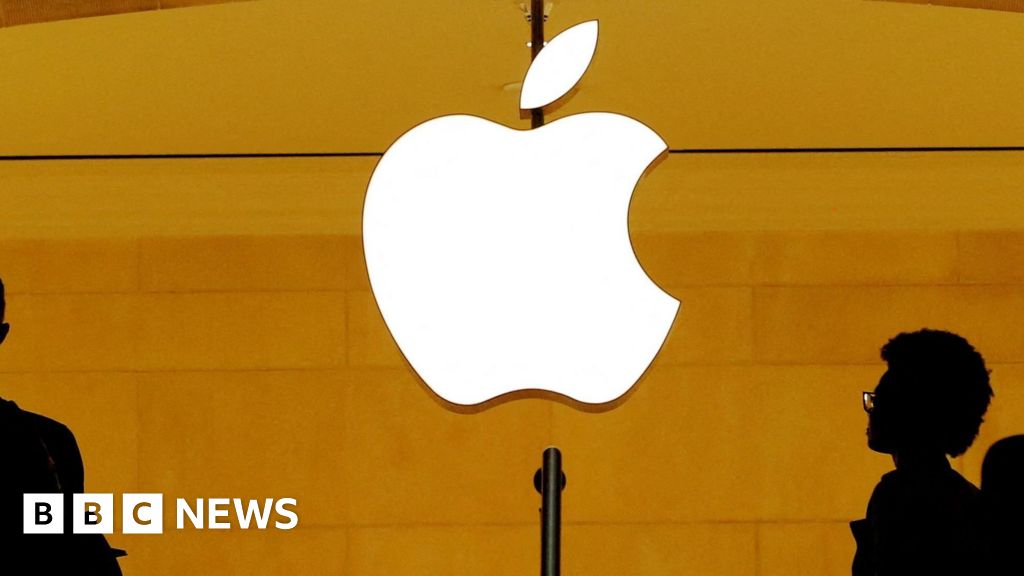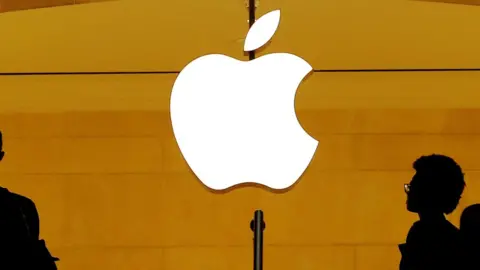Apple told to pay €13bn in tax by EU

 Reuters
ReutersApple has been told to pay €13bn (£11bn; $14bn) in unpaid taxes to Ireland by the European Court of Justice (ECJ).
The European Commission accused Ireland of giving Apple illegal tax advantages eight years ago but the Irish government has consistently argued against the need for the tax to be paid.
The ECJ said its decision on the matter was final and that “Ireland granted Apple unlawful aid which Ireland is required to recover”.
Apple said it was disappointed with the decision and accused the European Commission of “trying to retroactively change the rules”.
Back and forth
The Apple ruling means the ECJ has finally upheld the decision issued by the European Commission in 2016 after a lengthy back and forth legal process.
The decision covered the period from 1991 to 2014, and related to the way in which profits generated by two Apple subsidiaries based in Ireland were treated for tax purposes.
Those tax arrangements were deemed to be illegal because other companies were not able to obtain the same advantages.
The original ruling came at a time when the Commission was attempting to clamp down on multinational giants whom it believed were using creative financial arrangements to reduce their tax bills, but was overturned by the lower court of the ECJ in 2020 following an appeal by Ireland.
That verdict has now been set aside by the higher court, which said it contained legal errors.
Apple said in a statement: “This case has never been about how much tax we pay, but which government we are required to pay it to. We always pay all the taxes we owe wherever we operate and there has never been a special deal.
“The European Commission is trying to retroactively change the rules and ignore that, as required by international tax law, our income was already subject to taxes in the US.
“We are disappointed with today’s decision as previously the General Court reviewed the facts and categorically annulled this case,” Apple added.
The bad news for Apple comes a day after the tech giant released its new iPhone 16 range.
Why does Ireland not want the money?
The ECJ ruling means Ireland will have to recover the lost taxes from Apple – something Dublin has spent years of legal wrangling trying to avoid.
The Irish government has argued that Apple should not have to repay the back taxes, deeming that its loss was worth it to make the country an attractive home for large companies.
Ireland, which has one of the lowest corporate tax rates in the EU, is Apple’s base for Europe, the Middle East and Africa.
Although corporation tax rates for businesses are set nationally, and are not subject to the EU’s jurisdiction, the trade bloc does have extensive powers to regulate state aid and in this case, it argued that by applying very low tax rates to Apple, Ireland was granting it an unfair subsidy.
The latest decision is a colossal victory for the European Commission in its attempts to stop big companies bending the rules.
An expensive day for tech giants
Europe’s top court has also ruled that Google must pay a €2.4bn fine for abusing the market dominance of its shopping comparison service.
The tech giant had been appealing against the fine, which was originally levied by the European Commission in 2017.
Google said it was disappointed with the ruling, and pointed out it had made changes in 2017 to comply with the Commission’s decision.
At the time it was the largest penalty the Commission had ever levied – though a year later it issued Google with an even bigger fine of €4.3bn over claims it used Android software to unfairly promote its own apps.
Related
A New Book Argues That What Happens in Europe Doesn’t…
Remaking the World: European Distinctiveness and the Transformation of Politics, Culture, and the Economy by Jerrold Seigel “No issue in world
Poland plans military training for every adult male amid growing…
Poland’s prime minister, Donald Tusk, has said his government is working on a plan to prepare large-scale military training for every adult male in response t
2025 European Athletics Indoor Championships: Ditaji Kambundji secures women’s 60m…
Switzerland’s Ditaji Kambundji walked away from the 2025 European Athletics Indoor Championships in Apeldoorn on 7 March with much more than her first Europea
Takeaways from the EU’s landmark security summit after Trump said…
BRUSSELS (AP) — European Union leaders are trumpeting their endorsement of a plan to free up hundreds of billions of








